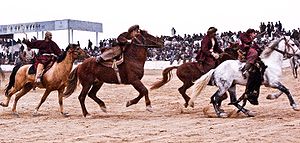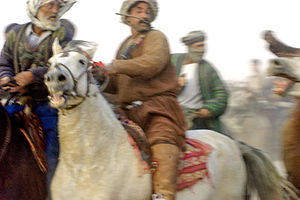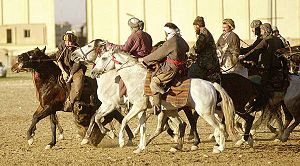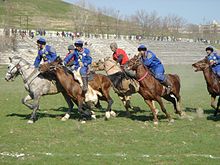- Buzkashi
-
Buzkashi or Kok-boru or Oglak Tartis or Ulak Tartysh (Persian, Urdu: بزکشی bozkæšī; Tajik: бузкашӣ buzkašī, "goat dragging"; Uzbek, Tatar: kökbörü, kök "blue" + börü "wolf"; Kazakh: көкпар; Kyrgyz: улак-тартыш or көкбөрү; Pashto: وزلوبه wuzloba, "goat game"; Turkmen: owlakgapdy; Uyghur: oghlaq tartish; Chinese: 叼羊) is a traditional Central Asian team sport played on horseback in Afghanistan, Uzbekistan, Tajikistan, Kyrgyzstan, Turkmenistan, northern Pakistan, Xinjiang Uyghur Autonomous Region of China and Kazakhstan.[1] The steppes' people were skilled riders who could grab a goat or calf from the ground while riding a horse at full gallop. The goal of a player is to grab the carcass of a headless goat or calf and then get it clear of the other players and pitch it across a goal line or into a target circle or vat.
Contents
Sport of Central Asia
Buzkashi is the Afghan national sport. It is also a popular sport among the south Central Asians such as the Uzbeks, Hazaras, Tajiks, Kyrgyz, Kazakhs, Turkmens and Pashtuns. The Turkic name of the game is Kökbörü; Kök = "blue", börü = "wolf", denoting the grey wolf—the holy symbol of the Turkic people. Other Turkic names of the game are Ulak Tartish, Kuk Pari, Kök Berü, and Ulak Tyrtysh. Kökbörü is the most popular national sport of Kyrgyzstan. In the West, the game (Turkish: Cirit) is also played by Kyrgyz Turks who migrated to Ulupamir village in the Van district of Turkey from the Pamir region.
File:The headless carcass of a goat used in Buzkashi..jpgThe carcass of a headless goat used in BuzkashiCompetition is typically fierce. Prior to the establishment of official rules by the Afghan Olympic Federation the sport was mainly conducted based upon rules such as not whipping a fellow rider intentionally or deliberately knocking him off his horse. Riders usually wear heavy clothing and head protection to protect themselves against other players' whips and boots. The boots usually have high heels that lock into the saddle of the horse to help the rider lean on the side of the horse while trying to pickup the calf. Games can last for several days, and the winning team receives a prize, not necessarily money, as a reward for their win. Top players, such as Aziz Ahmad, are often sponsored by wealthy Afgans.[2]
A Buzkashi player is called a Chapandaz. It is mainly believed in Afghanistan that a skillful Chapandaz is usually in his forties. This is based on the fact that the nature of the game requires its player to undergo severe physical practice and observation. Similarly horses used in Buzkashi also undergo severe training and due attention. A player does not necessarily own the horse. Horses are usually owned by landlords and highly rich people wealthy enough to look after and provide for training facilities for such horses. However a master Chapandaz can choose to select any horse and the owner of the horse usually wants his horse to be ridden by a master Chapandaz as a winning horse also brings pride to the owner.
The game consists of two main forms: Tudabarai and Qarajai. Tudabarai is considered to be the simpler form of the game. In this version, the goal is simply to grab the calf and move in any direction until clear of the other players. In Qarajai, players must carry the carcass around a flag or marker at one end of the field, then throw it into a scoring circle (the "Circle of Justice") at the other end. The riders will carry a whip, often in their teeth, to fend off opposing horses and riders.
Buzkashi is often compared to polo. Both games are played between people on horseback, both involve propelling an object toward a goal, and both get fairly rough. However, polo is played with a ball.. Polo matches are played for fixed periods totaling about an hour; traditional Buzkashi may continue for days, but in its more regulated tournament version also has a limited match time.
The calf in a Buzkashi game is normally beheaded and disemboweled and has its limbs cut off at the knees. It is then soaked in cold water for 24 hours before play to toughen it. Occasionally sand is packed into the carcass to give it extra weight. Players may not strap the calf to their bodies or saddles. Though a goat is used when no calf is available, a calf is less likely to disintegrate during the game.
Rules introduced by Afghan Olympic Federation
- The ground has a square layout with each side 400 meters long.
- Each team consists of 10 riders each.
- Only five riders from each team can play in a half.
- The total duration of each half is 45 minutes.
- There is only one 15 minute break between the two halves.
- The game is supervised by a referee.
- Based on the referee's decision a rider can be substituted during the game.
A similar game is "kokpar", a traditional Kazakh game played on horseback in which 2 teams of players compete to carry a headless goat carcass into a goal.Sports of China
In China, there is not only horse-back Buzkashi, but also yak Buzkashi among Tuziks.
Ban in Afghanistan
Buzkashi is the national sport and a "passion" in Afghanistan where it is often played on Fridays and matches draw thousands of fans. Whitney Azoy notes in his book "Buzkashi: Game and Power in Afghanistan:.... (that) leaders are men who can seize control by means foul and fair and then fight off their rivals. The Buzkashi rider does the same" [3] During the rule of the Taliban regime, Buzkashi was banned in Afghanistan, as the Taliban considered the game immoral. But since the Taliban regime was ousted the game is being played again.[4][5]
Kav Kaz
A mounted version of the game has also been played in the United States. In the 1940s young men in the Cleveland area of Ohio played a game they called Kav Kaz. The men - five to a team - played on horseback with a sheepskin-covered ball. The Greater Cleveland area had six or seven teams. The game was divided into three chukkers, somewhat like polo. The field was about the size of a football field and had goals at each end: large wooden frameworks standing on tripods, with holes about two feet square. The players carried the ball in their hands, holding it by the long-fleeced sheepskin. A team had to pass the ball three times before throwing it into the goal. If the ball fell to the ground, the player had to reach down from his horse to pick it up. One player recalls, "Others would try to unseat the rider as he leaned over. They would grab you by the shoulder to shove you off. There weren't many rules."[6]
Popular culture
Buzkashi is portrayed in several books, both fiction and nonfiction. It is shown in Steve Berry's book, The Venetian Betrayal, and is briefly mentioned in the Khaled Hosseini book The Kite Runner. Buzkashi was the subject of a book called Horsemen of Afghanistan by French photojournalists Roland and Sabrina Michaud. Gino Strada has written a book named after the sport (with the spelling Buskashì) in which he tells about his life as surgeon in Kabul in the days after 9-11 strikes. P.J. O'Rourke also mentions the game in discussions about Afghanistan and Pakistan in the Foreign Policy section of Parliament of Whores, and Rory Stewart devotes a few sentences to it in "The Places in Between."
There have been two books written about Buzkashi that were later turned into movies. The game is the core and subject of a novel by French novelist Joseph Kessel titled Les Cavaliers (aka Horsemen) as well as of the 1971 flick The Horseman which is directed by John Frankenheimer and Omar Sharif played the lead role. This film shows Afghanistan and its people the way they were before the wars that wracked the country, particularly their love for the sport of buzkashi.
The game is also a key element in the book Caravans by James Michener and the film of the same name starring Anthony Quinn. A scene from the film featuring the king of Afghanistan watching a game included the real-life king at the time, Mohammed Zahir Shah. The whole sequence of the game being witnessed by the king was filmed on the Kabul Golf Course, where the national championships were played at the time the film was made.The game also is mentioned in several movies. In Rambo III, directed by Peter MacDonald, released in 1988, John Rambo (played by Sylvester Stallone) was shown in a sequence playing Buzkashi with his mujahideen friends when suddenly they were attacked by Russians. The 1983 Tom Selleck film High Road to China features a spirited game of buzkashi. Buzkashi is described at length in Episode 2, "The Harvest of the Seasons," of the documentary The Ascent of Man by Jacob Bronowski. It is put in the context of the development, by the Mongols, of warfare using the horse and its effect on agricultural settlements. The film includes several scenes from a game in Afghanistan. The opening scenes of the Indian film Khuda Gawah, which was filmed in Afghanistan and India, show actors Amitabh Bachchan and Sridevi engaged in the game. The game is also mentioned briefly in John Huston's film The Man Who Would Be King, the movie Dodgeball: A True Underdog Story during advertisements for the fictional ESPN 8 (El Ocho) television channel, and the Bollywood movie Kabul Express. Composer Scott Fields recorded a piece called Buzkashi on the Clean Feed Records guitar compilation "I Never Meta Guitar."
See also
- Pato, a similar horseback Argentine sport
- Horseball, another game played on horseback
- Jugger, another game involving the transport of animal parts
- Yak racing
- Rugby union in Afghanistan
References
- ^ The traditional Oglak Tartis among the Kirghiz of the Pamirs
- ^ Abi-Habib, Maria; Fazly, Walid (13 April 2011). "In Afghanistan's National Pastime, It's Better to Be a Hero Than a Goat". The Wall Street Journal. http://online.wsj.com/article/SB10001424052748703841904576256632384932122.html. Retrieved 13 April 2011.
- ^ Tony Perry Afghans love to get their goat in rough national sport January 3, 2010 page A20 LA Times
- ^ Ban on Buzkashi
- ^ Buzkashi played again
- ^ Dean, Ruth and Melissa Thomson, Making the Good Earth Better: The Heritage of Kurtz Bros., Inc. pp. 17-18
- G. Whitney Azoy (2003), Buzkash:i Game and Power in Afghanistan, 2nd ed. Waveland Press.
- "Ancient Kyrgyz game may captivate Europe", The Times of Central Asia, 9 November 2006 (www.timesca.com)
- V. Kadyrov, Kyrgyzstan: Traditions of Nomads, Rarity Ltd., Bishkek, 2005 ISBN 9967-424-42-7
External links
Listen to this article (info/dl)
This audio file was created from a revision of Buzkashi dated 2005-04-17, and does not reflect subsequent edits to the article. (Audio help)More spoken articles- Photo-essay on Buzkashi in Tajikistan
- Afghanistan Buzkashi Pictures
- Afghanistan Online: Afghan National Sport (Buzkashi)
- Afghan Sport: Buzkashi
- The Fierce Afghani Game of Buzkashi
- Buzkashi In Mazar-e-Sharif
- Buzkashi - Afghanistan's Lovable National Sport
- Kok boru video from YouTube (Turkish)
- Kok boru video (Turkish)
- Mark Seager's Buzkashi Documentary
- Afghan Embassy in Australia
- Pictures of buzkashi in Afghan Pamirs
Interdependent team sports Basket sports Basketball (beach, deaf, FIBA 33, water, wheelchair) · Cestoball · Korfball · Netball (fastnet, indoor, wheelchair) · SlamballFootball codes Gridiron codesAmerican football (eight-man, flag, nine-man, six-man, sprint, touch) · Canadian football · Indoor football (arena)Hybrid codesAustus · Circle rules football · International rules football · Kronum · Samoa rules · Universal football · VolataMedieval football codesBa game · Caid · Calcio fiorentino · Camping · Cnapan · Cornish hurling · Cuju · Harpastum · Kemari · Ki-o-rahi · La soule · Lelo burti · Marn grook · Mob football · Royal Shrovetide · Uppies and downies · Yubi lakpiRugby codesBeach · Rugby league (masters, mini, mod, nines, sevens, tag, touch, wheelchair) · Rugby union (American flag, mini, sevens, snow, tag, touch, tens)Handball sports Bat-and-ball games Baseball · Brännboll · British baseball · Cricket (indoor, limited overs, ODI, test, Twenty20) · Danish longball · Extreme baseball · Kickball · Lapta · Oină · Over-the-line · Pesäpallo · Rounders · Softball · Stoolball · Town ball · VigoroStick and ball sports Cammag · Composite rules shinty-hurling · Hurling (camogie) · Lacrosse (box/indoor, field, intercrosse, women's) · Polocrosse · ShintyHockey sportsBall hockey · Bandy (rink) · Broomball (Moscow) · Field hockey (indoor) · Floor hockey · Floorball · Ice hockey (power) · Inline hockey · Ringette · Roller hockey · Rossall hockey · Skater hockey · Sledge hockey · Street hockey · Underwater hockey · Underwater ice hockey · Unicycle hockeyPolo sportsCanoe polo · Cowboy polo · Cycle polo · Elephant polo · Horseball · Pato · Polo · Segway polo · Yak poloBall over a net sports Biribol · Bossaball · Fistball · Football tennis · Footvolley · Jianzi · Footbag net · Peteca · Sepak takraw · Throwball · Volleyball (beach, paralympic) · Ball badmintonOther sports Airsoft · Basque pelota (frontenis, jai alai, xare) · Buzkashi · Curling · Cycle ball · Dodgeball · Gateball · Kabaddi · Kho kho · Lagori · Paintball · Pétanque · Rollball · Roller derby · Tchoukball · Ulama · Ultimate · Underwater rugby · Water polo (inner tube) · Wheelchair rugby · Underwater football · WhirlyballCategories:- Team sports on horseback
- Central Asia
- Sport in Uzbekistan
- Sport in Afghanistan
- Sport in Kyrgyzstan
- Sport in Pakistan
Wikimedia Foundation. 2010.




